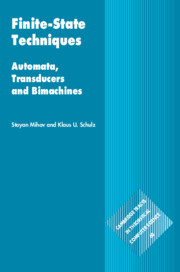Crossref Citations
This Book has been
cited by the following publications. This list is generated based on data provided by Crossref.
Camtepe, Seyit
Duda, Jarek
Mahboubi, Arash
Morawiecki, Pawel
Nepal, Surya
Pawlowski, Marcin
and
Pieprzyk, Josef
2021.
Compcrypt–Lightweight ANS-Based Compression and Encryption.
IEEE Transactions on Information Forensics and Security,
Vol. 16,
Issue. ,
p.
3859.
Hoffmann, Stefan
2021.
Developments in Language Theory.
Vol. 12811,
Issue. ,
p.
192.
Cakir, Merve Nur
Saleemi, Mehwish
and
Zimmermann, Karl-Heinz
2021.
On the Decomposition of Generalized Semiautomata.
WSEAS TRANSACTIONS ON INFORMATION SCIENCE AND APPLICATIONS,
Vol. 18,
Issue. ,
p.
34.
Cakir, Merve Nur
Saleemi, Mehwish
and
Zimmermann, Karl-Heinz
2021.
Cascade Products of Stochastic Automata.
WSEAS TRANSACTIONS ON COMPUTERS,
Vol. 20,
Issue. ,
p.
168.
Shopov, Georgi
Gerdjikov, Stefan
and
Mihov, Stoyan
2023.
StreamSpeech: Low-Latency Neural Architecture for High-Quality on-Device Speech Synthesis.
p.
1.
Meinhardt, Eric
Mai, Anna
Baković, Eric
and
McCollum, Adam
2024.
Weak determinism and the computational consequences of interaction.
Natural Language & Linguistic Theory,
Vol. 42,
Issue. 3,
p.
1191.



